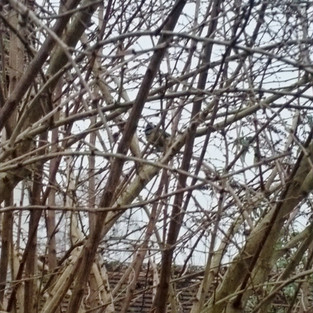Groundhog Day & Protecting the Nation's Seeds
- Clare
- Feb 2, 2021
- 4 min read
Updated: Feb 10, 2021
How apt that today (2nd February) is Groundhog Day. Like Bill Murray's dissatisfied weatherman from the 1993 film of the same name, it seems that we are stuck in a time loop of increasingly repetitive days that seem to merge into one. The movie follows the main character's changing emotions, from confusion and amusement, through frustration, anger and despair, to acceptance and ultimate redemption - emotions that have unfortunately been shared by many of us in one form or another over the past twelve months.
The tradition which underpins "Groundhog Day" originates from weather-obsessed European immigrants who took little nuggets of weather lore with them on their journey to America. The superstition follows the belief that, if a groundhog sees its own shadow as it emerges from its burrow on 2nd February, Winter will persist for another six weeks (conversely, if the animal fails to see its shadow, Spring will come early). I am sorry to announce that, this morning at 7.25 a.m. (local time), a groundhog named Punxsutawney Phil was awakened from his burrow and conveyed the following prediction to his Inner Circle:
It is a beautiful morning this I can see,
With all my fans viewing virtually.
With my faithful followers being safe and secure,
Our tradition of Groundhog Day must endure.
We all have passed through the darkness of night,
But now see hope of morning’s bright light.
When I turn to see, there is a perfect shadow cast of me.
Six more weeks of winter there will be!
(Fortunately, Phil also announced that the Spring that follows will be "one of the most beautiful and brightest springs you’ve ever seen.").
In several religions, the date of 2nd February has associations with rituals of cleansing and the coming of light and, as I ventured into the garden today, I was pleased to see the emergence of several more signs of the coming Spring. Best of all, my lovely little snowdrops are finally opening up. "Ah, there you are again" I whispered as I passed them this morning and they bowed me a gentle greeting:

Peony shoots are also starting to poke through the earth, snowy white flowers are opening on my camellia and the currant bushes are covered in buds, making me dream of blackcurrant jams and pies in the Summertime. A little blue tit with a punk hair-do was also chattering noisily as he played hide and seek with me in the branches of the Berberis (he was evidently cross that I had interrupted his hunting for spiders) and our resident robin was hopping around looking for worms. It's hard to be sad when you have a garden.
Now we are in February, my attention has also turned to seed planting and I was very pleased to receive my first order of seeds and several bags of compost in the post this week. It's funny how the arrival of new seed packets can feel like Christmas, especially if (like me), you get carried away and then forget what you ordered! I will be planting chilli and sweet peas this month, and also some herbs for indoor growing.

The "grow your own" seed business in this country is worth millions, though the controls and registration processes associated with the development and marketing of new seed varieties can result in very narrow ranges ultimately being offered for sale. This limits biodiversity and may result in older varieties being lost forever. I learned this week of the admirable organisation "Garden Organic" (previously The Henry Doubleday Research Association), which strives to conserve vegetable varieties that are not widely available by distributing over 40,000 packets of seeds each year to its members. Seeds offered by the organisation can include landrace varieties that are particularly well suited to specific areas (for example, the Thrupp parsnip which has adapted to grow well in a region close to Stroud in Gloucestershire), and heirloom varieties that have been saved over many generations. Many of these seeds have been harvested from open-pollinated plants by the wonderfully named "Seed Guardians", a community of local growers who replenish Garden Organic's seed banks from their own gardens and allotments.
I always find seed collecting one of the most rewarding jobs of the gardening year, mostly as seeds can be so expensive and its hugely satisfying to be able to replenish the stocks of your favourite plants for free, or to swap seeds with other gardeners in the community. I particularly love the little brush-shaped seeds of the cornflower and the immense number of seeds that can be harvested from plants such as foxglove, mullein and poppy.

The joy of growing plants from seed was summed up rather nicely by Seed Guardian Josie Cowgill in The Guardian newspaper recently (Plotting the future: the ‘seed guardians’ bringing variety to UK gardens | Environment | The Guardian):
"Its difficult times we are living in. We have got a pandemic, we've got climate change, we've got biodiversity loss, habitat loss and economic collapse as well. It might feel quite small, just saving beans and growing your own food, but actually I think its really fundamental.
By doing something infinitesimally small like this tiny little gesture in a tiny little group, in a tiny little country somewhere, you are working towards something that makes you feel more hopeful. It's a positive step. I'm not saying this is a magic wand or a cure-all, but it's a positive step".
If Candlemas Day be fair and bright
Winter will have another fight.
If Candlemas Day brings cloud and rain,
Winter won't come again.
Phil Connors (Groundhog Day): Do you ever have deja vu Mrs Lancaster?
Mrs Lancaster: I don't think so, but I could check with the kitchen.

















Comments